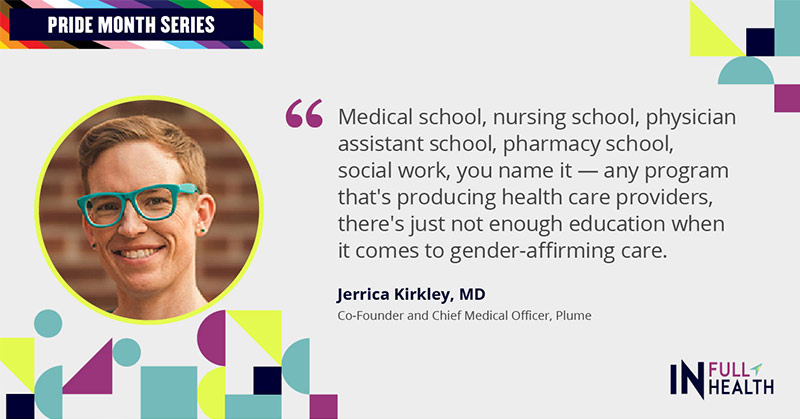June is Pride Month, and at In Full Health, we’re celebrating companies that are promoting more inclusive health care for the LGBTQ+ community.
 Plume provides high-quality gender-affirming care by meeting patients where they are and working to break down barriers that keep gender-diverse individuals from living their fullest lives.
Plume provides high-quality gender-affirming care by meeting patients where they are and working to break down barriers that keep gender-diverse individuals from living their fullest lives.
Co-Founder and Chief Medical Officer Jerrica Kirkley, MD (she/her/hers) — along with fellow Co-Founder Matthew Wetschler, MD, MPH — established Plume to meet the needs of the trans community through gender-affirming hormone therapy offered in a supportive, trans-led community.
As a part of our ongoing LGBTQ+ series, Dr. Kirkley discusses the barriers the trans community faces in health care, what Plume is doing to address them, and how they’re measuring the impact of their platform in real-time.
Read Part 2 of our conversation with Dr. Jessica Kirkley.
In Full Health (IFH): What unique obstacles impact access to and quality of gender-affirming care for the trans community?
Dr. Jerrica Kirkley: First and foremost, a lack of access to culturally and clinically competent health care providers. This is rooted in a lack of standardized education when it comes to gender-affirming care in health professional schools.
Medical school, nursing school, physician assistant school, pharmacy school, social work, you name it — any program that’s producing health care providers, there’s just not enough education when it comes to gender-affirming care. This includes the specifics of gender-affirming hormone therapy, gender-affirming surgery, and primary care implications as well as cultural competence in terms of understanding the lived experiences of trans patients and navigating issues outside of purely medical needs, such as social and legal needs.
Because there’s not as much exposure to the trans community — especially in medical settings — there’s a significant amount of stigma and discrimination that’s happening towards trans folks universally, but specifically in health care facilities.
Up to a third of trans people have noted that they have been discriminated against in some way in a health care facility in this country.
There are other barriers, as well, like lack of insurance coverage. It’s still not universal that health insurance companies — both public and private — are covering trans-related services like hormone therapy and surgery, which are life-saving and medically necessary for many trans people.
There has also been gatekeeping from within the medical system. Up until 2011, it was required under WPATH (World Professional Association for Transgender Health) guidelines that you had to see a therapist for a certain period of time and get a letter from the therapist just to be able to start hormone therapy. This essentially strips away all patient autonomy in that decision. That is no longer required, but there is still a legacy from that prior guideline. And many health care providers still will not even consider providing hormone therapy without somebody having seen a therapist before to say that it is okay.
This is still a requirement for gender-affirming surgery. And it is, to my knowledge, the only surgery in all of medicine, in which we require somebody to obtain an evaluation from a therapist and a letter. It’s truly unprecedented.
SUBSCRIBE
Stay in the loop about new blog posts from equitable health innovation leaders, helpful resources and tools to help you bring the Principles to life, upcoming events, and more by joining our email list.
SUBSCRIBEIFH: How is Plume addressing these obstacles?
Dr. Jerrica Kirkley: We are trying to take each one and flip it on its head.
First and foremost, we are building a care environment that’s centered around the community. We are providing services directly to the trans community — taking into account the lived experience of patients and making sure to address these barriers that come up.
That foundation of community-centric care is everything. For example, knowing that many people are mistreated in a health care facility, we are trying to build a health care system that affirms patients, that brings joy to the experience, and that makes sure the clinicians who are providing that care have both the clinical competence — the clinical skills and expertise for the unique needs of the trans community that come up — and also the cultural competence. And that comes in a couple of different ways.
One, ensuring everybody has an understanding and awareness of trans individuals and those unique needs. But also building the care team with people who share that lived experience.
Over 50% of our company is trans-identified themselves, along with many accompanying intersectional identities.
Dr. Jerrica Kirkley, MD
Co-Founder and Chief Medical Officer, Plume
We know that insurance can be a barrier for many people. That’s why we started with a cash-only direct pay option so that people didn’t have to use their insurance to see us, and we could provide care at a relatively affordable price. We are also looking to see how we can incorporate health insurance into this model as well, and expand access that way.
When it comes to removing gatekeeping, we try to take a personalized and patient-centric approach through informed consent. In an attempt to give autonomy back to the patient, we see ourselves as guides through the process. We have the privilege of having a lot of knowledge and information when it comes to medical decision-making and the risks involved. We make sure to communicate that to patients to help make a shared decision.
Regarding the gaps in medical education, while there are an increasing number of practices offering gender-affirming care, there still is a large gap in meeting the needs of the trans community across the country, especially outside of large metropolitan areas.We have a big focus on education with our clinicians. We attract medical providers who are mission-aligned and want to do this work, but some don’t have as much gender-affirming care experience because of the institutional barriers that have existed, and didn’t afford them the opportunity to have that training when they went through school. We do a lot of on-the-job training with our onboarding process and through continuing education for our providers. Our clinician team has over 100 years of gender-affirming care experience collectively.
There are other ways that we see ourselves transforming health care, and that can be through having such a large number of patients under one roof and leveraging the data that comes from that. Helping to answer clinical questions we’ve had for a long time, but haven’t had the studies to do so. Helping contribute to the standards of care when it comes to gender-affirming care.
On the policy side, we do a lot of work engaging with politicians and legislative offices to help ensure access to care for the trans community, which includes health insurance access, provider access, telehealth access, and modifying various regulatory policies.
Expressing Gratitude
I was part of a program called the Caldwell Fellows at North Carolina State University, which has a focus on service-learning, pushing students to get outside their comfort zone, and to literally “think big” — which was the motto of the program. Every patient interaction matters, but I always wondered how I could take what I was doing to an even bigger level. I can provide gender-affirming care and teach providers in my clinic how to do this. I can teach providers in my clinic system and across Colorado how to do this. I can teach providers in other states. I can actually build a system that feeds from all those experiences and has providers in every state, taking care of trans people across the country. And that is only the beginning.
Dr. Jerrica Kirkley, MD
Co-Founder and Chief Medical Officer, Plume
IFH: How do you measure the impact of Plume?
Dr. Jerrica Kirkley: The patient stories are always amazing. They are the inspiration. They are the reason that we do this. Those stories, on one level, are anecdotal. But we have so many of them — we have cared for over 15,000 patients. On a daily basis, we hear from people about how life-saving these services have been, and how having access to gender-affirming health care has helped them have more confidence in their life, decreased stress, decreased anxiety, decreased depression, and be able to actualize their authentic selves.
We are also starting to see the data back up these stories. We know that the trans community is disproportionately affected by mental health disparities — in particular, depression, anxiety, and self-harm.
What we’re seeing is a reduction in depression, anxiety, and suicidality, especially with participation in services, such as depression and anxiety medication management and peer-led support groups in conjunction with gender-affirming hormone therapy.
To me, this is the next chapter — where we can really start to answer some of the clinical questions that have been coming up, but also reiterate how life-saving these medications can be, or even beyond the medications, just affirming care itself. We have studies that demonstrate that things like gender-affirming hormone therapy improve mental health outcomes for trans people, including in youth. But a lot of those studies are limited in their numbers because it’s been hard to find consolidated networks of trans people. Plume is a unique environment where we have many thousands of trans people in one care environment — and are showing dramatic improvements in quality of life and health outcomes. To me, that can’t be argued with.
SUBSCRIBE
Stay in the loop about new blog posts from equitable health innovation leaders, helpful resources and tools to help you bring the Principles to life, upcoming events, and more by joining our email list.
SUBSCRIBE





Comments are closed.